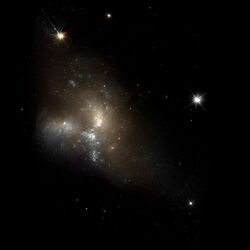Astronomy:NGC 1487
From HandWiki
Short description: Galaxy in the constellation Eridanus
| NGC 1487 | |
|---|---|
 Hubble Space Telescope image of NGC 1487 | |
| Observation data (J2000 epoch) | |
| Constellation | Eridanus |
| Right ascension | 03h 55m 46s[1] |
| Declination | −42° 22′ 01″[1] |
| Redshift | 0.002829[2] |
| Helio radial velocity | 848 ± 1 km/s[2] |
| Apparent magnitude (V) | 11.68[1] |
| Apparent magnitude (B) | 12.28[1] |
| Characteristics | |
| Type | Pec[2] |
| Other designations | |
| NGC 1487, MCG-07-09-002, LEDA 14117[1] | |
NGC 1487 is an irregular galaxy[3] in the constellation Eridanus. It was discovered by James Dunlop on Oct 29, 1826.[4]
It is thought to be the remnant of two galaxies, which are the components NGC 1487E and NGC 1487W, that collided about 500 million years ago.[5]
See also
Gallery
-
NGC 1487 by GALEX
References
- ↑ 1.0 1.1 1.2 1.3 1.4 "NGC 1487". SIMBAD. Centre de données astronomiques de Strasbourg. http://simbad.u-strasbg.fr/simbad/sim-basic?Ident=NGC+1487.
- ↑ 2.0 2.1 2.2 "NASA/IPAC Extragalactic Database". http://ned.ipac.caltech.edu/cgi-bin/objsearch?search_type=Obj_id&objid=55413&objname=2&img_stamp=YES&hconst=73.0&omegam=0.27&omegav=0.73&corr_z=1#BasicData_0.
- ↑ E.L. Aguero, S. Paolantonio (1997). "The Peculir Galaxy NGC 1489". The Astronomical Journal 114: 102. doi:10.1086/118456. Bibcode: 1997AJ....114..102A.
- ↑ Seligman, Courtney. "New General Catalog Objects: NGC 1450 - 1499". https://cseligman.com/text/atlas/ngc14a.htm#1487.
- ↑ Mullan, B.; Konstantopoulos, I. S.; Kepley, A. A.; Lee, K. H.; Charlton, J. C.; Knierman, K.; Bastian, N.; Chandar, R. et al. (2011). "Star Clusters in the Tidal Tails of Interacting Galaxies: Cluster Populations Across a Variety of Tail Environments". The Astrophysical Journal 731 (2): 93. doi:10.1088/0004-637X/731/2/93. Bibcode: 2011ApJ...731...93M.
External links
- NGC 1487 on WikiSky: DSS2, SDSS, GALEX, IRAS, Hydrogen α, X-Ray, Astrophoto, Sky Map, Articles and images
 |

